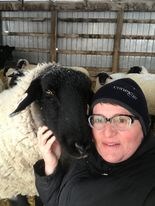ASSINIBOIA - “We knew nothing about raising sheep when we acquired three lambs for our young children about 18 years ago,” said Joanne Petersen.
Joanne and her husband Dale have ranched in the Cactus and Dirt Hills of RM 101 Terrell since 1999, with a large herd of cattle. As their family project grew, they already had the skills in place to develop it into a profitable and fascinating business.
“We were soon asked if we could supply fresh lamb to immigrants, particularly to those of South African descent and so we saw the opportunity to diversify for this niche market.”
Their flerd (flock and herd) of sheep has grown from the initial three lambs to over 70 ewes in peak years, but since the children have grown and moved on, they typically average about 40 ewes. The Petersens predominantly raise Suffolk sheep, known for their excellent meat. “We always breed our ewes to top quality purebred Suffolk rams to get optimum growth for the butcher lamb market.”
“The ewes are bred in September to lamb in February. We try to keep our lambing condensed into a two week cycle, and this year using a teaser ram worked very well. All but three ewes out of 37 landed in two weeks.”
Suffolk ewes are expected to bear twins. “A ewe producing only a single lamb is quickly culled from our flock. We also have ewes that consistently throw triplets and had six sets this lambing season.”
Saskatchewan is an ideal place to raise sheep. Gord Schroeder, executive director of the Saskatchewan Sheep Development Board, reports that nearly half of the entire province’s sheep producers live in the southwest and southeast. “There are 350 sheep producers in the south zone with 33,500 ewes. This is more than half of the ewes raised in the province.”
“The lambs are weaned in late April or early May onto fresh new spring grass. By mid to late August they are butcher weight and we start filling customer orders.” Most of their customers are from southern Saskatchewan but some are as far away as Outlook and Saskatoon. “Our customers value that direct link with their local producer. Farm Gating our own products takes added effort but our clients appreciate knowing who is raising the lambs, and how they were raised.”
All of the meat is butchered and processed at West Bridgeford Meats in Tugaske. Shane Oram runs the abattoir. “He has perfected cutting the meat to the South African cutting chart which is a fair bit different than traditional Canadian cuts.”
While Suffolk sheep are known mainly for the quality of their carcass, their wool is also a useful product.
Most of the Canadian wool is marketed in China, but currently the market has bottomed out. In a normal year the Petersen’s pack their wool in burlap sacs and take it to the nearest collection site which for them is the Pituley Ranch near Kildeer. There are several wool depots around Saskatchewan. From there, all the wool is trucked to the Canadian Cooperative Wool Growers in Carleton Place Ontario, not far from Ottawa where it is sorted and compressed into huge bales for shipping overseas.
Joanne is active on social media, often posting photos and stories of her sheep. “People are fascinated with our sheep.” It has become an educational opportunity as she answers questions. One of the most common questions she’s asked is, “Why do you sheer the sheep in January when it is so cold?”
First, sheep easily acclimatize without their wool as long as they have good shelter for the first few days. “It seems crazy to remove their wooly coats in the winter but it does not harm them. It’s the same reason why they can survive a hot summer day in that wooly coat!” Second, Joanne adds that it is so much easier for newborn lambs to find the udder on a shorn ewe than on a ewe in full fleece, which makes for optimum lamb growth. And third, shorn ewes need to eat more feed to stay warm in winter. This in turn results in better milk production, and that benefit is passed on to the lambs, which in turn makes Petersen’s and their customers very grateful.
Joanne has no plans to get out of sheep production. “They bring me much satisfaction and joy. It’s a therapeutic hobby!”



